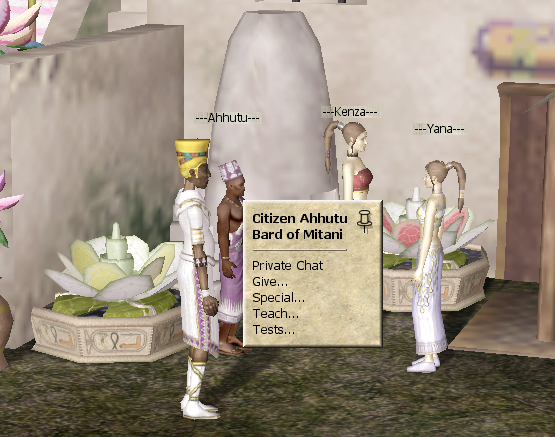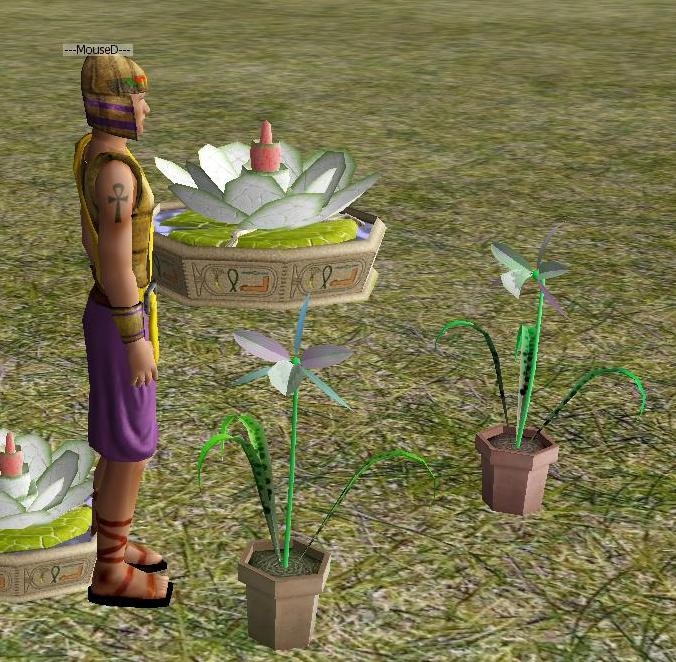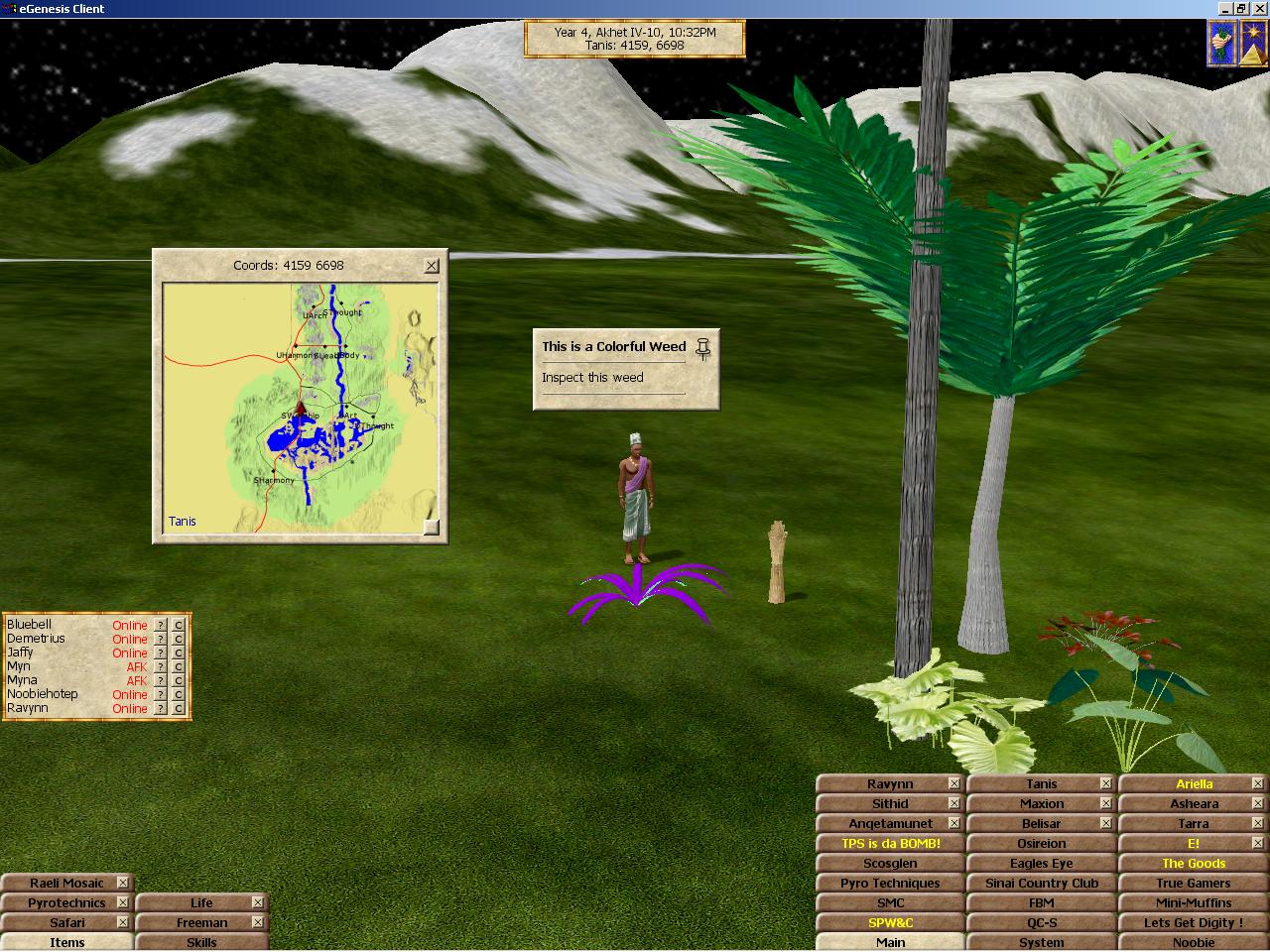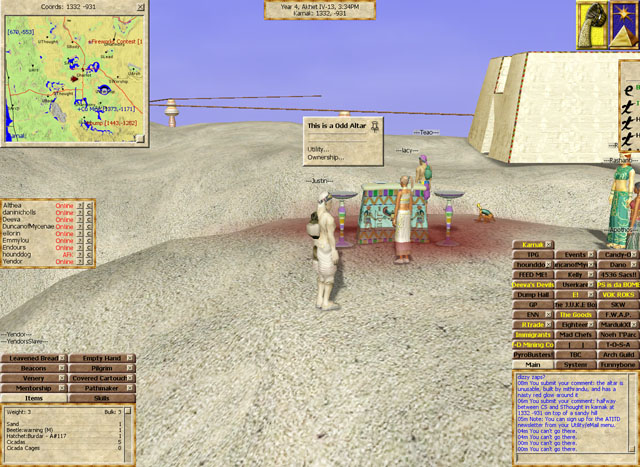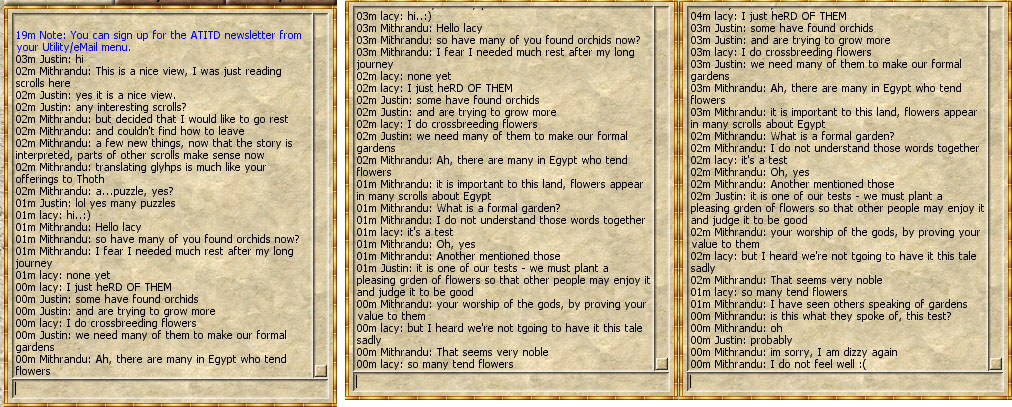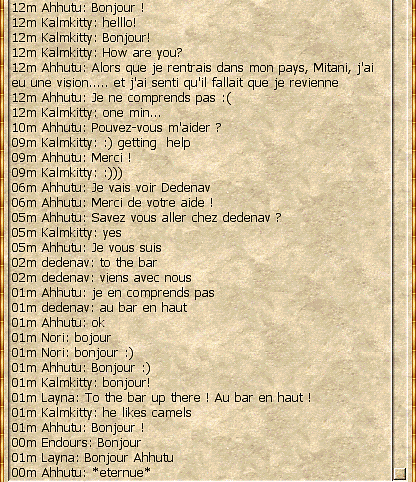Mithrandu Message to Egypt
"I do not know how long this altar will remain
I can feel its power beginning to ebb
I do not wish for this flower to be lost, we must try to gain more of the seeds of the last night before the altar is gone.
I will return :)
Mithrandu Anzeige nach Ägypten
"Ich weiß nicht, wie lang dieser Altar bleibt
Ich kann seiner Energie glauben, zur Ebbe anzufangen
Ich wünsche nicht für diese verloren zu werden Blume, wir muß versuchen, mehr der Samen des gestern Abend zu gewinnen, bevor der Altar gegangen wird.
Ich komme zurück :)
Message de Mithrandu à l'Egypte
"Je ne sais pas combien de temps l'autel và perdurer.
"Je sens ses pouvoirs se déliter.
"Je ne souhaite pas que ces nouvelles variétés de fleurs soient perdues, nous devons faire de notre mieux et récolter un maximum de bulbes la nuit prochaine, avant que l'autel ne disparaisse.
"A plus tard ! :)
On Year 4, Akhet IV-9, a player named Ahhutu was seen in Seven Lakes. When chatted by Yana, a french player who had looked up his info, he said he was a Bard from Mitani, he added that he had found an old manuscript and that he would share the story if given something to drink. He also said that two other bards like him were traveling in Egypt, but not from the same place (Mitani?), and that they didn't speak the same language. He told the first part of the story after some wine, another part after some beer, and when he was about to tell the last part, a page of the manuscript crumbled to dust in his hands.
Later that same day two other bards were seen in other regions, Eulenspiegel and Mithrandu. All three told the same story, but each one in a different language.
Ahhutu
"Le fils caché de Geb " Il est bien connu que Nut (le ciel) et Geb (la terre) ont été mariés, et que Nut a donné naissance aux premiers grands dieux de l'Egypte. Les noms de leurs puissants fils et filles sont Osiris, Isis, Set, et Nephtys. Aprés leur naissance, Shu (l'air) s'est placé entre Nut et Geb, afin que le monde n'ait pas à supporter davantage de puissance. Nut était ravie, ses enfants étaient de puissants dieux et déesses. Elle s'étendit au-dessus d'eux pour l'éternité pour les protéger et surveiller leurs œuvres. Geb, leur père, devint leur maison, et le monde a pu évoluer dans la prospérité. Nut n'est pas la seule à avoir mis au monde des fils et des filles. Geb, nous le savons a également donné la vie, mais il n'a pu accomplir cela seul. Pendant que Shu surveillait Nut, Geb a reconsidéré ses plans. Shu ne s'attendait pas à ce qu'un enfant puisse naître du père. Connaissant la vigilance de Shu, Geb fit appel à Tefnut (la pluie) pour qu'elle l'aide, au nom des enfants vivants dans son corps. Tefnut avertit Geb que le monde n'est pas infini, il ne supportera pas davantage de divinités sans engendrer le chaos. Geb supplia Tefnut, promettant qu'il couperait ses enfants, les réduisant à de tous petits morceaux, si seulement elle l'aidait à mettre au monde. Finalement Tefnut céda, et donna sa bénédiction à Geb. Alors que Tefnut pleurait, le cœur de Geb s'ouvrit, et il en jaillit les fleurs et les arbres. Respectant la parole donnée à Tefnut, il découpa ses enfants avant ce jour, de façon à ce que chacun soit merveilleux et magnifique, mais sans voix ni âme, condamné à n'être qu'une infime partie de l'enfant originel. Ces morceaux, Geb les nomma graines. Il en donna à ses autres enfants, afin qu'ils prennent soin de leurs cadets et apportent bien sur le monde. Il y eut toutefois une graine que Geb n'a pas voulu donner si aisément. Cette graine la plus chère à son coeur elle représentait la partie la plus puissante des enfants qu'il avait porté en lui. Craignant que Shu détruise la graine qu'il dissimulait, Geb lui murmura, alors qu'elle était encore dans son ventre : "Ne fleurit que la nuit, quand Shu dort et que Nut veille sur toi car tu es aussi sa fille. Un jour, un beau jeune homme viendra te recueillir mais jusqu'à ce jour, tu dois rester cachée." Durant de longues années, personne ne perça le secret, jusqu'à ce que par un heureux hasard, Nefertem découvrit la floraison nocturne. Avec son aide, il put soigner Ré, gagné par la lassitude après avoir pris forme humaine. Nefertem nomma la fleur Orchidée, et l'emmena depuis ce jour-là dans tous ses voyages. Il n'apprit qu'à peu de ses prêtres l'art d'amadouer l'orchidée pour la faire fleurir, et d'en faire germer les graines.
Eulenspiegel
Es ist uns überliefert wie Nut (der Himmel) und Geb (die Erde) verbunden wurden und wie Nut die ersten großen Götter Äqyptens gebar. Die Namen ihrer mächtigen Söhne und Töchter sind uns bekannt: Osiris, Isis. Set und Nepthys. Mit ihrer Geburt setzte sich Shu (die Luft) zwischen Nut und Geb um ihre Stärke erhalten. Nut war einverstanden; ihre Kinder wurden mächtige Götter und Göttinnen. Um sie und ihre Arbeit zu schützen und zu beobachten, streckte sie sich ewiglich über sie. Geb, ihr Vater, gab sich selbst als Heimat hin und die Welt wuchs geschwind.Nun ist es nicht nur Nut die die Söhne und Töchter gebar. Geb, so wie uns bekannt ist, gab genauso Leben aber nicht allein. Während Shu über Nut wachte, schmiedete Geb einen Plan, da Shu kein Kind von dem Vater erwartete, sondern nur von der Mutter. Wissend von Shus Unachtsamkeit, bändelte (liebäugelte) Geb mit Tefnut (dem Regen) um mit ihm zu verbünden, seines ungeborendes Kindes wegen das noch in seinem Körper lebte.
Tefnut warnte Geb das die Welt nicht endlos groß ist und weitere Mächtige die Welt ins Chaos stürzen könnten. Geb depatierte mit Tefnut, versprach er würde sein Kind in kleine Teile zerbrechen, wenn sie ihn nur ein Leben in dieser Welt garantieren würde. Tefnut willigte ein und ergoß ihren Segen über Gebs Körper.
Unter Tefnuts Tränen öffnete sich Gebs Herz und es entsprangen Blumen, Bäume und sämtliche Arten wachsender Dinge. Wie er Tefnut versprach zerbrach er sein Kind vorher und so war jedes wundervoll und großartig, aber ohne eigene Stimme oder Gedanken, nur ein Teil des eigentlichen Kindes. Diese Teile nannte Geb Saaten und er gab Saaten an seine anderen Kinder daß sie ihre Geschwister hüten und das Gute über die Welt bringen könnten.
Nur eine Saat gab Geb nicht einfach heraus. Sein liebstes, welches das mächtigste Teil seines Kindes war, was er einst in sich trug. Aus Angst Shu würde die Saat, die er noch verbarg vernichten, flüsterte er noch in seinen Leib sanft zu ihm „Blühe ausschließlich bei Nacht, wenn Shu schläft und Nut über Dich wacht, denn Du bist auch ihr Sohn. Eines Tages, wird ein schöner junger Mann kommen und Dich erlösen, aber bis dahin mußt Du verborgen bleiben.“
Für viele Jahre kannte niemand das Geheimnis, bis Nefertem die Nachtblüte zufällig entdeckte. Mit ihr heilte er Re's Müdigkeit indem er die Gestalt eines Mannes annahm. Nefertem gab der Blume den Namen Orchidee, die ihn, von da an, immer begleitete. Nur wenigen seiner Priester lehrte er die speziellen Wege die Orchidee zum blühen zu überreden und ihre Saat zu kultivieren.
Mithrandu
It is told to us how Nut (the sky) and Geb (the earth) were married, and how Nut gave birth to the first of the great gods of Egypt. The names of their mighty sons and daughters, are known to us: Osiris, Isis, Set and Nepthys. With their birth, Shu (the air) placed himself between Nut and Geb, for the world could hold no more greatness. Nut was content; her children were mighty gods and goddesses. She stretched eternally above them to watch and protect them and their works. Geb, their father, gave them himself as a home, and the world grew apace. Yet it is not only Nut who gave birth to sons and daughters. Geb, it is known to us, gave birth as well, and not alone did he achieve this. While Shu watched over Nut, Geb considered his plans, for Shu did not expect children to be borne of the father, only of the mother. Knowing Shuís watchfulness, Geb appealed to Tefnut (the rain), interceding for the sake of the unborn children yet living within his body. Tefnut warned Geb that the world was not limitless and that no more great ones could walk upon it without inviting chaos. Geb pleaded with Tefnut, promising that he would break apart his children into pieces, fracturing them into small parts, if only she would grant them life in this world. Eventually, Tefnut conceded, and poured out her blessing upon Geb's body. As Tefnut wept, Geb's heart opened wide, and from him sprang flowers and trees, and all manner of growing things. True to his word to Tefnut, he broke apart his children before that day, and so each was wonderful and great, but had no voice or thought, being only a small piece of the original child. These pieces Geb called seeds, and he gave seeds to his other children, so they could tend their siblings and make good the world. Yet one seed Geb did not so easily give. This seed he held dearest, for it was the mightiest part of the children heíd carried within him. Fearing that Shu would destroy the seed he hid, Geb whispered softly to it, still inside his belly. ìBloom only at night, when Shu sleeps and Nut will watch over you, for you are her son also. One day, a beautiful young man will come to claim you, but until that time, you must remain hidden." For many long years, none knew the secret, until by chance Nefertem discovered the night bloom. With it, he healed Re of his weariness, caused by taking the form of a man. Nefertem named the flower Orchid, and from then, carried it with him in all things. Only to his few priests did he ever teach the special ways of coaxing Orchid to bloom, and of cultivating his seeds.
The Bard Mithrandu combined 3 of our new found orchids at this altar in Karnak 1322,-931 to from a new orchid, Hidden in Darkness as pictued below. We have found that all the flowers planted at this altar have been burned and are now listed as unknown owners.

4th Orchid Hidden Darkness.
The Events continued: update
Mithrandu appeared in Karnak on a sandy hill - she seemed to not be able to find her way down. she was talking about flowers being important in Egypt, and she said she was reading scrolls, and that translating glyphs was like our offerings to Thoth, a puzzle. then she complained of feeling dizzy and ill, and got zapped, at which point, an odd altar appeared. she went to rest.
at the point the altar appeared, Mithrandu was struck by lightning. After this she announced she was tired and needed to rest and was going to lie down here.
Approximately one hour after Mithrandu came, Eulenspiegel came along also. he had this to say.
Eulenspiegel: oooh...
Eulenspiegel: Eumel - mir gehts gar nicht gut....
Eulenspiegel: *schniiief*
Eulenspiegel: mir schwiden die Sinne... *dreh
Eulenspiegel: *stűrz*
Eulenspiegel: ...
- sorry people arrived before I could print screen the rest of the conversation. It was suggested at the time that he was complaining of 'the senses shrink from me'.
Ahhutu's disappearance
Sometime after the second Bard dispeared due to something effecting him, Ahhutu came along.
It was on Y4, Akhet IV-14, around 1:30 AM (
Ahhutu appeared on east bank of Nile by Karnak. Kalmkitty made the first contact, Dedenav quickly offered help as a french translator. Ahhutu asked to drink a beer and got one by Dedenav's compound.
He talked to us about a vision he got in his dream about a young lady feinting near a reddish altar. This was reffering to Eulenspiegel's incident and when told we knew where the altar was, he asked to be walked there.
Une vision d'une jeune femme, se trouvant a cote d'un autel rouge sang
Et elle S'evanouissait
Je ne ne sais pas, mais j'ai le pressentiment qu'il faut que j'y aille
A vision of a young lady, standing by a blood red altar
And she feinted
I don't know why, but I feel like I need to go there.
He didn't knew what to do once there, but wished to go there because it in his vision. Once there he immediatly got another vision :
Thanks to Layna for the english of this text.
...
Voix d'outre tombe
Cet autel... est mystique
Un parchemin... Un... sombre... parchemin...
...est caché... à l'intérieur
Ahhutu *s'évanouit*
...
...
Voice from beyond the grave
this altar is mystical
A parchment. A dark parchment
..is hidden..in there
Ahhutu feinted
........
